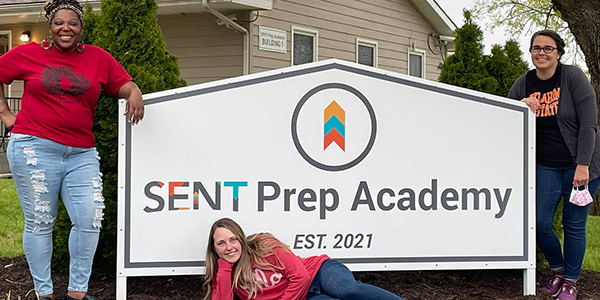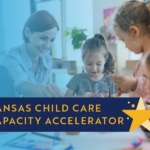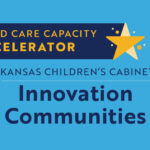Making Lemonade out of COVID Lemons
Businesses cannot operate without employees.
Employees cannot work without child care.
For working Americans, this is our first (and hopefully last!) experience in a pandemic work environment. No other challenge has so deeply impacted the structure and cadence of work life than our inability to physically work in an office while our children sheltered at home alongside us.
In 2019, the Kansas Children’s Cabinet & Trust Fund (KCCTF) partnered with Department of Children and Families (DCF), Kansas Department of Health and Environment (KDHE), and the Kansas Department of Education (KSDE) on a comprehensive, statewide Needs Assessment which documented a lack of affordable, accessible childcare for too many Kansans. These issues were thrust into the spotlight and amplified in 2020, with no easy answers.
The pandemic showed us the value of child care to overall economic stability. Businesses cannot operate without employees; employees cannot work without child care.
The work of implementing the All In For Kansas Kids Strategic Plan was equally affected by 2020 conditions. Strategic Plan Goal #4, Private Sector Collaboration, is intended to promote family-friendly workplaces and create a state-level public private partnership envisioned as a catalyst for innovation. COVID-19 forced us to rethink our approach.
In spring of 2020, a child care facility operating in southeast Topeka closed after nearly 30 years due to COVID-19. The neighborhood was an identified “child care desert” and in desperate need of a solution. Enter Strengthening and Empowering Neighborhoods Together (SENT), a non-profit foundation launched in 2018 as a grassroots philanthropy. Their mission is to work within under-resourced communities in Topeka to transform neighborhoods by improving housing, mental health, and community. Reopening the shuttered child care facility was high on their list of priorities.
SENT’s mission is to work within under-resourced communities in Topeka to transform neighborhoods by improving housing, mental health, and community. ~ senttopeka.org
SENT worked closely with Child Care Aware of Eastern Kansas to draft a business plan and explore financing options for the purchase of the site and start-up costs. Although there were many different avenues for partnership and support once they got their doors open, finding the seed money necessary to catalyze the project was proving to be a real impediment.
This is where we got creative. Building on the vision of our strategic plan, the Children’s Cabinet took a risk and provided a one-time grant for SENT to purchase the property and invest in renovations to re-open as a childcare facility newly licensed to care for infants and toddlers in addition to 3-5-year-olds. Catapulted by the strength of the Children’s Cabinet investment, the Topeka Community Foundation soon voted to provide additional working capital, private donors made cash gifts and in-kind contributions, and volunteers stepped in to help.
SENT will join the Capital Area Successful Start (Head Start) program, a community partnership fueled by Early Childhood Block Grant funds once open.
By making an exception to our normal Children’s Cabinet investment process, we successfully re-imagined and enacted the public-private partnership model originally envisioned. It is not only different, but better. By honoring local decision-making and community engagement, this investment aligns the Children’s Cabinet vision with the needs of this particular neighborhood. This version of a local-to-state, public-private partnership can serve as a model for so much of the work and the results we envision in the All In For Kansas Kids Strategic Plan. We are excited to feature this SENT project as a demonstration site and blueprint for future work in more and more Kansas communities.
The SENT Prep Academy, as it will be known, opens with a ribbon cutting on April 17 and will ultimately serve about 80 children full-time from age six weeks through six years, with another 16 school-age children on days off from public schools. An additional aspect of SENT goals is to be a community space for workforce training and help ensure competitive wages for adults interested in careers in early childhood. The center’s workforce development programs are scheduled to begin in the fall.
As one of the private donors to SENT put it, “With this investment, we can make lemonade out of the lemons COVID-19 has given us.” For the Children’s Cabinet the pandemic is forcing us to sometimes change our approach, and we are excited by the incredible opportunity this represents.





